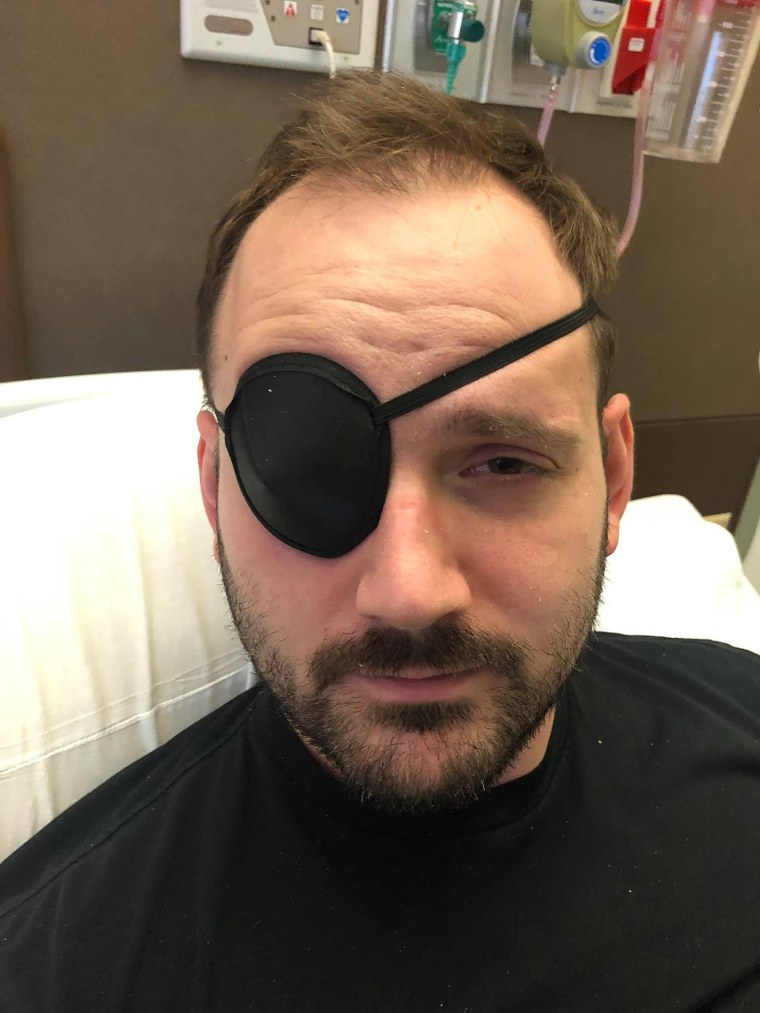A 28-year-old Oklahoma man trying to alleviate some pain by stretching his neck “heard a pop” — which doctors say directly led to a stroke.
While he is accustomed to cracking his neck, Josh Hader said he wasn’t trying to do that when he was working from home on March 14. He simply rolled his neck to the right to try and mitigate some pain that he’d been experiencing for a couple of weeks.
“I used my hand to apply a slight bit more of pressure, and then heard a pop,” Hader told NBC News. “Then everything on my left side started to go numb.”
The father of two and former police officer from Guthrie, Oklahoma, said he “kind of had an idea that this might be a stroke” so after calling his wife, he took a look in the mirror, and was encouraged that he didn’t see any facial drooping.
But when he tried to go to the fridge to get an ice pack, he said he was “walking at almost a straight 45 degree angle to the left.”
“I was tripping over myself trying to walk straight,” Hader said. “It was actually impressive that I couldn’t walk straight whatsoever.”

By the time his father-in-law arrived to take him to the hospital, Hader said his symptoms had “worsened tenfold.”
“Everything started spinning. I could barely walk,” Hader said. On the way into the emergency room at Mercy Hospital in Logan County, his father-in-law had trouble supporting him because he was tilting so much to the left.
After a CT scan, Hader was told he had suffered a stroke caused by a blood clot, which could be treated with a tissue plasminogen activator drug, or tPA.
“I remember hearing a doctor at the ER yelling out to staff, ‘we have 12 minutes to administer this,'” Hader said. “That’s when everything kind of landed home.”
Hader got the drug in time, and was then transferred to Mercy Hospital in Oklahoma City. That’s where he was told he had suffered an ischemic stroke, caused by “a clot or obstruction blocking the supply of blood going to your brain,” according to Mercy Hospital.
Hader’s clot was caused by a small tear in a vertebral artery. He says doctors told him the “direct cause” of the stroke “was by stretching my neck.”
Doctors told him they see about three or four cases a year of strokes caused by a torn vertebral artery, mostly after car accidents or other impacts.
But “I was the only self-manipulation case they had ever seen,” Hader said. “Great way to break a record,” he added.
Hader remained in the ICU for four days, and didn’t leave the hospital until March 29. But he kept his spirits up throughout his treatment.
“Captain’s Log: Started day 2 of Therapy. Entered into the wheelchair derby 2019. Started an underground bingo club. Constant diet of jellybeans,” Hader posted on Facebook less than a week after the stroke.
The next day, he shared he had “learned that I can still walk (although not as good as my 1 year old son).”
“I’m a little bit of a jokester,” said Hader, who also has a 5-year-old daughter.
“It’s a traumatic event friends and family are experiencing with you … so I try to keep their spirits up,” he said. “I don’t know if it works, but I hope it does.”
Hader said he is still experiencing vision issues caused by the stroke, but is optimistic that he will be able to go back to his job with Dell in the next couple of weeks.
Meanwhile, Mercy posted Hader’s story on Facebook Thursday in an effort to warn others. “Think twice before cracking your neck!” the post said, accompanied by a reminder that May is National Stroke Awareness Month.
Hader said his wife, Rebecca, always told him not to crack his neck because she “hated the popping, and she knows it’s not healthy for you.”
He said the first thing he said to her when she got to the hospital was: “I’m so sorry for cracking my neck.”
Now, he said, he’s kicked the habit. “Usually half way to bending my neck, I’m like, ‘Nope, nope. Don’t do that.'”
But it was a lesson hard-learned.
A vascular specialist recently told Hader he was “extremely lucky” the outcome wasn’t much worse. “He held up two fingers so close together, and said ‘you were about this close from going into a coma.'”

